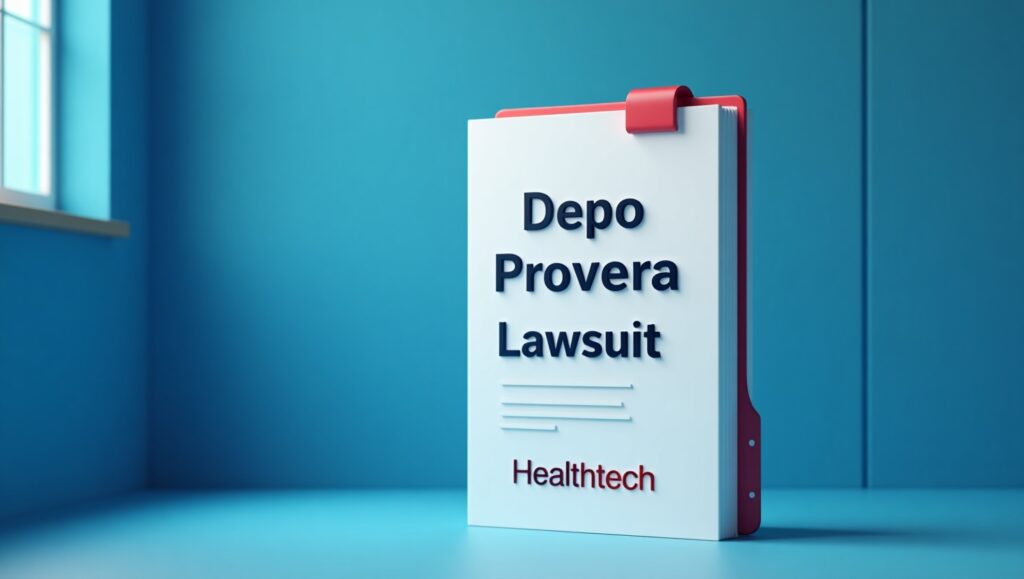The Depo Provera Lawsuit raises a critical question: How did a medication used by millions of women worldwide become the center of a legal and medical storm? For decades, Depo-Provera has been hailed as a convenient, long-acting contraceptive, offering women freedom from daily pills with just a quarterly injection. Yet beneath its reputation as a trusted birth control solution lies a growing controversy: emerging research links its synthetic hormone, medroxyprogesterone acetate (MPA), to meningiomas, slow-growing brain tumors that, while often benign, can cause life-altering neurological damage. Now the lawsuits against Pfizer, its manufacturer, surge into the hundreds.
In this article, we’ll explore the main reason behind growing Depo Provera lawsuits, dive into the scientific digital evidence fueling these claims, and examine Pfizer’s response. We’ll also uncover how these legal battles are driving changes in health tech innovations, highlighting the critical role of research in ensuring safe contraceptives, and considering what this could mean for future regulations in the industry.
Key Takeaways
- The Depo Provera Lawsuit focuses on potential links between the contraceptive Depo-Provera and brain tumors, particularly meningiomas.
- Recent studies show that long-term use of Depo-Provera increases the risk of developing brain tumors, prompting legal action against Pfizer.
- Lawsuits have raised awareness of medication risks and are pushing for tighter regulations in the health tech industry regarding birth control safety.
- Pfizer acknowledges risks associated with Depo-Provera but faces criticism for delayed warnings about its potential hazards.
- Women affected by Depo-Provera can file lawsuits for compensation and seek legal assistance to navigate the process.
Table of Contents
What is Depo-Provera?
Depo-Provera is a birth control injection made of the hormone progestin. The approach is popular because it’s highly effective and can last for a long time with minimal maintenance. The FDA approved the Depo-Provera shot in 1992. Despite safety concerns, many women use it because it is a fast and convenient approach. Some known side effects of the Depo Provera lawsuit before lawsuits were filed included bone density loss, weight gain, and mood changes.
Brain Tumors Links with Depo-Provera
Recent studies suggest that Depo-Provera may cause brain tumors. These tumors develop around the brain’s protective layers. Long-term use of Depo-Provera increases the risk of developing these tumors in women.
A study published in 2024 found women who received injections of Depo-Provera for more than a year were five times more likely to develop meningiomas than those who never got the shot. Thus, it is one major reason women increasingly file a Depo Provera shot lawsuit.
In 1983, researchers suggested that hormones similar to those in Depo-Provera were a possible and dangerous risk for brain tumors. Unfortunately, the warning was ignored at the time. Also, the new 2024 study has brought attention to these previous concerns and helped many women understand the risks they potentially face.
Major Timeline in Depo Provera Lawsuits
| Date | Event Description |
|---|---|
| 1967 | The FDA rejects Depo-Provera’s initial application for birth control. |
| 1983 | The first study links progesterone to meningiomas (brain tumors). |
| 1992 | The FDA approves Depo-Provera as a birth control method. |
| 2024 | A new study was published showing the link between Depo-Provera and brain tumors. |
| 2025 | Multidistrict litigation (MDL) begins with new lawsuits filed across the U.S. |
Pfizer’s Response to These Allegations
Pfizer has officially acknowledged some risks associated with prolonged use of Depo Provera, as uncovered by recent studies. The company has stated, “We are aware of this potential risk associated with long-term use of progestogens and, in collaboration with regulatory agencies, are in the process of updating product labels and patient information leaflets with appropriate wording.”
Despite this, critics argue that Pfizer’s delayed action to include relevant warnings in U.S. documentation reflects a significant oversight, considering evidence began emerging years prior.
Depo Provera Lawsuit Impact on HealthTech
Regulatory Impact
According to the health organization, long-term birth control methods such as Depo-Provera must be used with caution due to the increasing number of Depo-Provera shot lawsuits. These lawsuits resulted in tighter regulations on how drugs are monitored once they are on the market. Now, health tech companies focus on systems that detect and warn people about such dangerous side effects earlier.
Data-Driven Decisions
Due to electronic health records (EHR), doctors have many tools to track patients’ medication use and health. This allows health tech companies to create systems that can spot side effects earlier when they are less severe.
For example, these systems can read a patient’s history and monitor changes in health that could be related to taking a particular drug. It allows doctors to decide which drugs are safe and how they should be used.
Innovation in Risk Detection
The technology is changing how physicians track and identify issues with medications through artificial intelligence (AI) and big data. For example, it could examine a large number of patient data to identify patterns that could be signs of drug side effects, as in the case of Depo-Provera.
These technologies can predict which patients will most likely have adverse effects from particular drugs. Hence, early alerting can enable doctors to make decisions and modify medication plans to prevent harmful side effects.
Personalized Medicine
The lawsuits create an increasingly personalized health industry in which treatments are tailored to an individual’s physiology. Doctors can also use data from HealthTech systems to understand how the medication acts on each patient.
For instance, AI might assist in determining a person’s risk for developing side effects based on their health history. In turn, it is also associated with risks of harmful side effects of drugs like Depo-Provera, which would be reduced with safer use.
Increased Patient Awareness
The rise in lawsuits has also helped make patients aware of medication risks. Women who use birth control methods such as Depo-Provera are more likely to be informed about potential side effects now.
Health tech platforms and applications are helping to give users updated information about the hazards associated with drugs. These tools can help women better understand what options are available to them and make more informed decisions regarding their health.

Depo Provera Lawsuit Impact on Medical Research
More Attention to Hormonal Contraceptives
The lawsuits and research into Depo-Provera and brain tumors are encouraging more research on hormonal birth control. Scientists are aiming to focus on the long-term effects of these birth control methods on women’s health.
Move-in Clinical Trials and Testing
Now, pharmaceutical companies are being extra cautious about testing birth control methods. Subsequent clinical trials will involve more people to ensure the drug is safe for everyone. These trials will also look into the long-term risks, such as the risk of brain tumors.
Ethical Implications
The Depo-Provera lawsuit 2025 raises questions about how far pharmaceutical companies should be responsible for ensuring safety. These companies need to be upfront about the risks and safeguard public health. In the future, they will likely face stricter rules to ensure safety.
How Women Effected by Depo-Provera Can File a Lawsuit?
Women could file a lawsuit if they used Depo-Provera and then developed a brain tumor. First, they must find a lawyer dealing with these types of cases. An experienced attorney can help determine eligibility for the Depo Provera lawsuit.
- Filing Deadline: If you were diagnosed with a brain tumor after receiving at least two doses of Depo-Provera, you can file a claim.
- The procedure: After you confirm your eligibility, you may register for a Depo Provera lawsuit with a law firm.
Legal Counsel Role in Mass Tort Cases
Attorneys who manage many similar cases, known as mass torts, can guide you through the process. They’ll assist in gathering all of the documentation and medical records you’ll need for your case.
Resources for Affected Women
If you feel Depo-Provera injured you, help is available in many settings:
- Legal assistance: Many law firms will give you a free consultation to see if you have a case.
- Medical help: Doctors, specialists, and other healthcare providers can assist with the diagnosis and treatment of any health issues caused by the shot.
Conclusion
The Depo Provera lawsuit is deeply impacting the healthtech and medical research industry. Researchers find that Depo-Provera is associated with brain tumors, and more women have come forward. It’s raising awareness of the risks of long-lasting birth control options and could affect how these drugs are tested and monitored.
If you used Depo-Provera and struggled with health complications, such as brain tumors, help may be available. You can also get help from doctors and lawyers if you are eligible for a lawsuit from Depo-Provera. With the continuous advancement of health tech and research, we hope to see safer and more effective variants of birth control methods in the near future.
FAQs
Meningiomas are tumors that grow in the layers surrounding the brain and spine. While most are non-cancerous, they can cause headaches, vision problems, and seizures.
Depo-Provera releases progestin, which prevents ovulation and thickens cervical mucus. Hence, it is effective in preventing pregnancy for up to three months.
Alternatives to Depo-Provera include birth control pills, IUDs, and implants. The doctor can help you choose the best option based on your needs.
Yes, long-term use of Depo-Provera can lead to bone density loss, weight gain, and mood changes.
If you believe Depo-Provera has caused health issues, consult your healthcare provider first. The Depo Provera lawsuit can help you seek compensation for any health complications. If you are eligible, you can file a Depo Provera lawsuit to address the risks associated with this medication.











